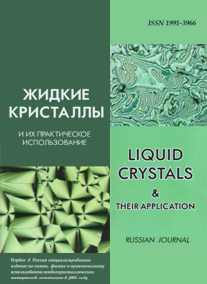|

|
Liquid Crystals and their Application
Russian Journal Zhidkie kristally i ikh prakticheskoe ispol'zovanie Жидкие кристаллы и их практическое использование |

|
|

|

|
|
|
Menu

|
|
|
|
|
Zhidk. krist. ikh prakt. ispol'z. = Liq. Cryst. and their Appl., 2017, 17 (1), 34—42.
DOI: 10.18083/LCAppl.2017.1.34 |

|
|
Determination of Concentrations of Surface-Active Materials in Aqueous Solutions at Different pH Values Using Liquid Crystals
|
N. Popov1, A. Smirnova1, N. Usol'tseva1, P. Popov2
|
Author affiliations
1Nanomaterials Research Institute, Ivanovo State University,
39 Ermak St., Ivanovo, 153025, Russia
E-mail: nv_usoltseva@mail.ru
2Kent State University, Department of Physics,
103 Smith Hall, Kent, Ohio, 44242, USA
|
|
Abstract
Determination of the content of environment polluting chemical agents is of significant importance. The goal of this study was the development of experimental approaches for detection of concentrations of surface-active molecules (surfactants) such as sodium dodecyl sulfate (SDS) and Triton X-100 in aqueous environments with varying pH level. Nematic and chiral-nematic type liquid crystals (LCs) were used as sensor materials. The pH levels in aqueous system were tuned by injection of certain amounts of acetic acid or ammonium hydroxide. In this work, we used LC thin films formed on the standard transmission electron microscopy (TEM) grids that were put in contact with aqueous subphases containing the surface-active material. The changes in the textures of the thin film LC samples were identified by polarizing optical microscopy. We have determined the influence of pH environment on the minimum concentration of surface-active materials required for the transition of the hybrid molecular alignment into homeotropic molecular alignment in the nematic LC films (or for the collapse of the nematic films). This pH influence and the change of the helical pitch in the films of chiral-nematic type under increasing concentration of the surface-active component are proposed as approaches for estimation of its concentration in the aqueous subphase.
Keywords: liquid crystals, surfactants, pH of environment, collapse of the nematic films
|
|
|
|
|
|




